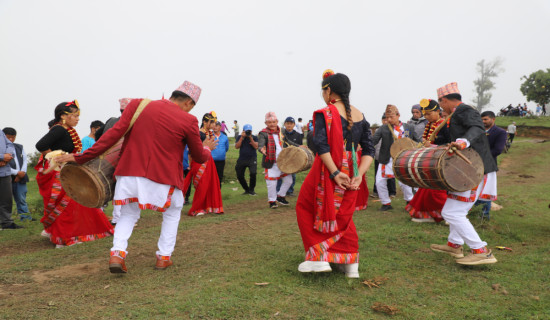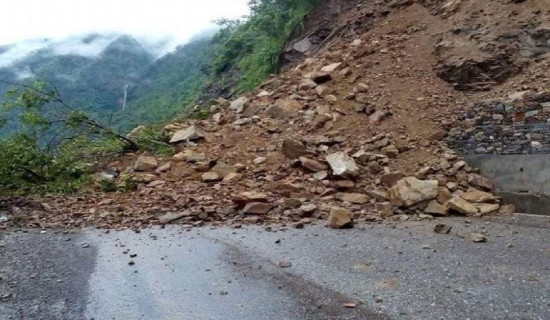- Sunday, 1 June 2025
Karnali's Climate Crisis
Agriculture sector is perhaps hardest hit by the climate change. The altering weather patterns often put farmers in soup. Erratic rainfall that is characterised by short- and heavy rainfall disrupts the calendar of crop planting. The crops shrivel and die out due to the drought or short rainfall. Other times, heavy downpours inundate and wash away the standing crops. Negative impacts of climate change do not end here. Crops are becoming the home of new kinds of diseases, and insects that were once unknown in the given areas. As a result, farmers find it difficult to grow healthy crops, jeopardising food security and economic stability. The news published in this daily has shown the grave situation of Karnali Province due to the climate change triggered by the soaring global warming. The emerging climatic crisis has threatened the livelihoods of vulnerable communities. The concrete action is needed urgently as traditional farming methods falter and natural resources dwindle.
Such crises have particularly serious implications for women and children, who often bear the big burdens. Women, who play crucial roles in farming, are struggling with increased pressures as they attempt to adapt to new agricultural challenges while managing household chores. The lack of resources and support only adds to their difficulties, creating a cycle of hardship that seems impossible to break. Likewise, the drying up of traditional water sources has forced many families to relocate to higher ground, leaving behind their homes for a stable future. This migration puts additional strain on community resources and has led to rising rates of malnutrition among children—an alarming consequence of a crisis often overlooked.
Recently, stakeholders gathered at Rara Lake to discuss the impacts of climate change in Karnali Province. The group included local-level representatives, climate change activists, government officials, relevant authorities, and conservationists. These conversations reveal that communities in Karnali are not just passive victims of climate change; they are actively seeking solutions to the challenges they face. It is vital that these local concerns are acknowledged at a national level, but this recognition must translate into concrete actions that support communities, whose livelihoods are under constant threat.
The proposed Karnali Declaration is a positive step that aims to bring local issues on a global stage, especially as COP 29 approaches. However, declarations alone are insufficient. What is needed is a comprehensive approach that includes funding for sustainable farming practices, investments in climate-resilient infrastructure, and educational programmes that equip farmers with the skills to adapt to their changing environment. Policymakers must listen to the voices of those directly affected by climate change. Their insights should be incorporated into strategies and action plans that are practical and culturally sensitive.
Collaboration among government agencies, local organisations, and international partners can provide pragmatic idea to the solutions of this problem by addressing the immediate impacts of climate change as well as its root causes. As the world gears up for COP 29, the woes enduring the Karnali people must resonate through the high-level negotiations involving global leaders, policy makers and experts. The concerned authorities must mobilise resources, share knowledge, and build resilience to tackle the growing climate challenges. The future of Karnali — and the world — depends on our collective response to this pressing issue.













-original-thumb.jpg)


